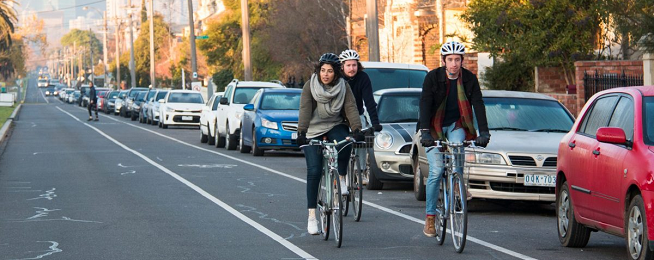A new study comparing current and potential future cycling trends found that over 200,000 premature deaths could be prevented each year if countries support high levels of urban cycling.
The study by Colorado State University in collaboration with the Barcelona Institute for Global Health, modeled the benefits of promoting urban cycling up to 2050 in the following 17 countries: Brazil, Canada, China, Denmark, Egypt, France, Germany, India, Indonesia, Italy, Japan, Mexico, Netherlands, Russia, South Africa, United Kingdom and the U.S.
2050 modelling was based on existing policies that have been proven to quickly increase bike riding levels, such as:
- Retrofitting biking infrastructure onto existing roads to create networks on arterial streets, small residential streets, and intercity roads.
- Implementation of bike-share systems in large cities.
- Reforming laws and enforcement practices to better protect active transport.
- Investment in walking facilities and public transport to offer trips that can be combined with bike trips.
- Elimination of policies that support additional motorized vehicle use, such as free parking and fuel subsidies.
- Establishment of congestion pricing, travel fees and development impact fees to charge a price for driving.
The research team then used a quantitative health impact assessment methodology that measured physical activity benefits against the risks associated with fatalities and inhalation of air pollution during the bike trip.
The study found that among urban populations (20-65 year olds) of the 17 countries, 205,424 annual premature deaths could be prevented if high bike use scenarios are achieved by 2050, assuming that 100% of the new bike trips made are replacing car trips.
In a more conservative analysis, if only 8% of bike trips replaced car trips, 18,589 annual premature deaths could be prevented by 2050 in the same population.
The study concluded: "We found that global bike use may provide important reductions in premature mortality by 2050. If biking trips above current trends are achieved by 2050, 205,424 annual premature deaths could be prevented among [the countries previously listed].
"The mortality benefits of physical activity drive the health impacts estimated in this study. In all countries and scenarios analyzed, the benefits of physical activity outweighed the mortality risks related to air pollution inhalation and road traffic fatalities.
"Future reductions in premature mortality of bike use will depend on current and future transport and built environment policies, promoting active transportation, car–bike substitution, air quality, and traffic safety. Implementing ambitious urban policies supporting biking and car–bike substitution should be considered key public health interventions for a healthy urban design."
Senior author of the study, Rojas-Rueda said: "This study should be seen as a call to implement policies that support sustainable mobility and a healthy urban design. Current policies will impact our future and the health of future generations."
The study was published in Environmental Health Perspectives.
You can see the full study here.
Become our friend
Find out more about Bicycle Network and support us in making it easier for people to ride bikes.


